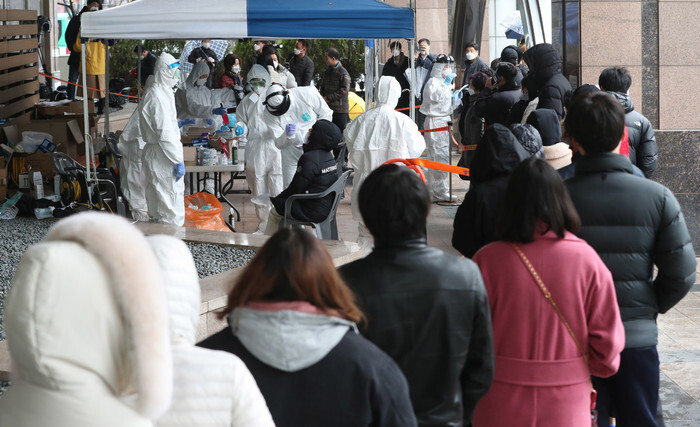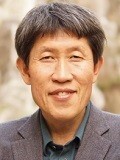hankyoreh
Links to other country sites 다른 나라 사이트 링크
[Column] The coronavirus has exposed S. Korea’s social, political vulnerability to disasters

It’s a good thing there haven’t been many cases of the novel coronavirus among Korean-Chinese and other Chinese nationals living in Ansan, Gyeonggi Province, and other parts of the country. If there had been even 10 such cases, the vendetta against the Chinese would have reached astronomical proportions. But after their push to ban entry from China didn’t work, the conservative press and political opposition have been bludgeoning the government over the chronic shortage of face masks. In a time of national crisis, all they’ve done is look for excuses to bash the current administration.
Disasters like the current one always incite fear and anxiety, and that anxiety can be whipped into a panic by the press and political parties. When that panic is exploited by those with power, facts are stretched and distorted, and minority groups in society are made the scapegoat. Political forces can play up the prejudices of the anxious masses, driven by their survival instinct, with tragic results.
Just as the corrupt and decadent church invented witches to hunt during the Middle Ages, a political crisis prompted the Japanese right wing to turn against Koreans during the Great Kanto Earthquake of 1923, spreading rumors that Koreans had poisoned the wells. As a result, more than 5,000 innocents were slaughtered. Something similar happened in the panic after the outbreak of the Korean War on June 25, 1950, when President Syngman Rhee found a scapegoat in the hundreds of thousands of already converted “commies” in the Bodo League. Political groups’ fear and their desire to remain in power can turn a disaster or war into an even greater catastrophe.
This outbreak of the novel coronavirus would appear to be based on humanity’s wrong-headed obsession with economic development. But whereas not much can be done about the mutation of viruses and the resulting disaster, political forces are the ones that have exponentially multiplied such disasters’ impact, when they could have mitigated it. If China were a democratic state with greater transparency, it could have controlled the initial risk in Wuhan and contained its spread. Even in South Korea, the disease could probably have been brought under control in mid-February, if only the Shincheonji religious sect’s followers who congregated in Daegu or visited that city had been honest about their actions and obeyed the government’s instructions to quarantine themselves.
Having learned a big lesson from the outbreak of MERS (Middle Eastern Respiratory Syndrome), the South Korean government was quick to produce testing kits and was just as swift in taking the necessary administrative steps, earning praise for testing as many people as possible in a short time. We should also admire the dedication of the public servants and medical staff involved in those efforts. The situation has been made much worse by people stocking up on masks, politicians and the media running inflammatory stories that stoke fears and bash the government, and people willfully harming others. The result is that precious lives have been lost, while workers living from hand to mouth and small businesses are fighting to survive.
But because public healthcare has always been extremely vulnerable to infectious disease and because there are not nearly enough hospitals to house the surging number of patients, doctors to treat them, or institutions to conduct in-depth research into such diseases, South Korea remains vulnerable to disasters, and its vulnerability will be made apparent by disasters to come.
Park Geun-hye’s botched response to MERS and the Sewol tragedySouth Koreans still recall vividly how former President Park Geun-hye and her government responded to the MERS outbreak and the sinking of the Sewol ferry. Those tragedies were the result of an absent and irresponsible government, whose neoliberal policies abetted companies in their rash pursuit of profit. The Japanese government exhibited a similar tendency to duck responsibility after the Tohoku earthquake on Mar. 11, 2011, and the resulting Fukushima nuclear disaster. Inadequate government programs likely bear much of the blame for the large number of COVID-19 deaths in Iran and Italy.
Disasters and other crises always lay bare the chronic ailments afflicting a government and society. Disasters are most dangerous for vulnerable members of society. It also becomes apparent which groups will take responsibility for the government and society and which people will work on behalf of their neighbors and their community. When the press and politicians aren’t able to properly disclose facts, determine causes, or devise a plan of action, a disaster becomes a catastrophe. The anti-social behavior exhibited by the followers of the Shincheonji religious sect and the pastors of large churches has been abysmal. Their exclusive concern for their closed communities and their disregard or outright ignorance of the concept of social responsibility is the twisted face of civic society in South Korea; once this epidemic has passed, they will have to be held accountable.
We need to completely reconsider the policy of keeping patients in inhumane closed-off hospital wards or group quarantine facilities. The spread of an infectious disease cannot be resolved on the level of the individual or the corporation. “Medicity Daegu,” as the city’s promoters liked to call it to tout its outstanding medical programs, turned out to be the most vulnerable city in the disaster.
If this epidemic inspires South Korea to overcome its vulnerability to disasters, it can become an advanced country capable of responding effectively to the crisis of climate change, the energy crisis, the food crisis, and the crisis resulting from the next outbreak of infectious disease. To be sure, South Korea should take the lead in overcoming global civilization’s vulnerability to such disasters.

By Kim Dong-choon, professor of NGO studies at Sungkonghoe University
Please direct comments or questions to [english@hani.co.kr]

Editorial・opinion
![[Column] Life on our Trisolaris [Column] Life on our Trisolaris](https://flexible.img.hani.co.kr/flexible/normal/500/300/imgdb/original/2024/0505/4817148682278544.jpg) [Column] Life on our Trisolaris
[Column] Life on our Trisolaris![[Editorial] Penalties for airing allegations against Korea’s first lady endanger free press [Editorial] Penalties for airing allegations against Korea’s first lady endanger free press](https://flexible.img.hani.co.kr/flexible/normal/500/300/imgdb/original/2024/0502/1817146398095106.jpg) [Editorial] Penalties for airing allegations against Korea’s first lady endanger free press
[Editorial] Penalties for airing allegations against Korea’s first lady endanger free press- [Editorial] Yoon must halt procurement of SM-3 interceptor missiles
- [Guest essay] Maybe Korea’s rapid population decline is an opportunity, not a crisis
- [Column] Can Yoon steer diplomacy with Russia, China back on track?
- [Column] Season 2 of special prosecutor probe may be coming to Korea soon
- [Column] Park Geun-hye déjà vu in Yoon Suk-yeol
- [Editorial] New weight of N. Korea’s nuclear threats makes dialogue all the more urgent
- [Guest essay] The real reason Korea’s new right wants to dub Rhee a founding father
- [Column] ‘Choson’: Is it time we start referring to N. Korea in its own terms?
Most viewed articles
- 1New sex-ed guidelines forbid teaching about homosexuality
- 260% of young Koreans see no need to have kids after marriage
- 3[Column] Life on our Trisolaris
- 4OECD upgrades Korea’s growth forecast from 2.2% to 2.6%
- 5Presidential office warns of veto in response to opposition passing special counsel probe act
- 6Months and months of overdue wages are pushing migrant workers in Korea into debt
- 7[Guest essay] Maybe Korea’s rapid population decline is an opportunity, not a crisis
- 8[Editorial] Penalties for airing allegations against Korea’s first lady endanger free press
- 9[Reportage] On US campuses, student risk arrest as they call for divestment from Israel
- 10Korea sees more deaths than births for 52nd consecutive month in February